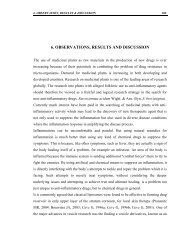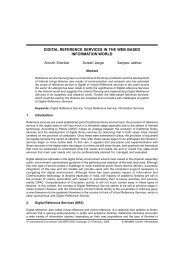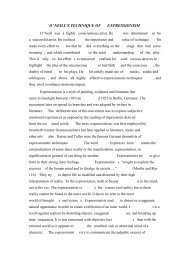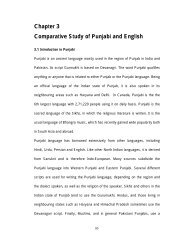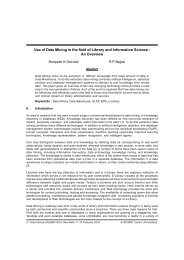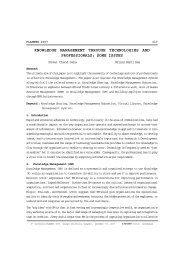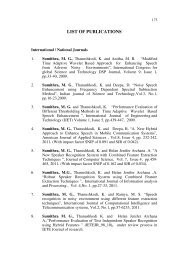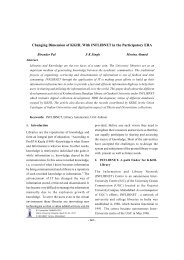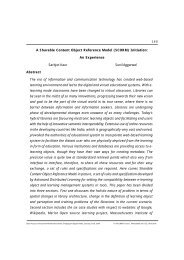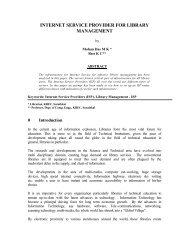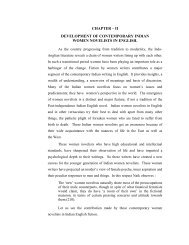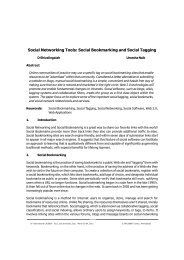Planning for Library Automation: Academic Libraries - DSpace ...
Planning for Library Automation: Academic Libraries - DSpace ...
Planning for Library Automation: Academic Libraries - DSpace ...
- No tags were found...
You also want an ePaper? Increase the reach of your titles
YUMPU automatically turns print PDFs into web optimized ePapers that Google loves.
<strong>Planning</strong> <strong>for</strong> <strong>Library</strong> <strong>Automation</strong>: <strong>Academic</strong> <strong>Libraries</strong> 22------------------------------------------------------------------------------------------------------------------------------------------User acceptance and enthusiasm <strong>for</strong> your new automated system is certainly an important ingredient in asuccessful planning ef<strong>for</strong>t. If you are implementing a public access catalog, it is probably the mostimportant measure of success.Public relations can allow you to accomplish three things:? make users aware of your new system and services;? motivate them to use the system; and,? train them in using the new system and services effectively.RETROSPECTIVE CONVERSIONIn the rush to acquire hardware and software, librarians often <strong>for</strong>get that their most valuable product is thelibrary's database. The creation of a high-quality machine-readable database provides the cornerstoneupon which all present and future automation ef<strong>for</strong>ts rest. Vendors will come and go, hardware willbecome obsolete, software will be replaced, but a well-constructed, well-maintained database, with itsaccompanying local holdings, will be the library's transportable and viable link from system to system.Moreover, as library users begin to access not only their local system but systems in other libraries aswell, the quality of respective databases will influence both the outcome of search strategies and theavailability of materials.Database readiness has several important facets:? Catalog records must be carefully converted from manual to machine-readable <strong>for</strong>mats;? Collections must be prepared <strong>for</strong> conversion through effective and ongoing weeding andinventory programs;? Once converted, collections must be properly maintained as titles are added, withdrawn,transferred and recataloged; and,? Standards -- <strong>for</strong> bibliographic, item and patron records as well -- must be adhered to. Inparticular, adherence to well-established and accepted standards of description <strong>for</strong> bibliographicin<strong>for</strong>mation in a machine-readable database is critical because:? without standards, files cannot easily be transferred from one automated system to another, and,? it is essential <strong>for</strong> libraries wishing to participate in resource sharing arrangements with otherlibraries, who will require such adherence as a condition of participation.CONCLUSIONIn an increasingly complex and global in<strong>for</strong>mation environment, a <strong>Automation</strong> of library is of vitalimportance in enabling end users to search through large quantities of in<strong>for</strong>mation. Effective resourcesharing nowadays requires an infrastructure, which permits users to locate materials of interest in bothprint and electronic <strong>for</strong>mat. Access across multiple collections is becoming increasingly critical. A centralunion catalogue linked to article citation databases, full text resources and local library resources, incombination with a functional user interface and powerful search- and index engine, offer importantbenefits to users. Predictions based on current trends of course ignore one importance factor.Technological advances are often unpredictable, and frequently the most exciting and the most significantare those which can least be <strong>for</strong>eseen. When breakthroughs come, there<strong>for</strong>e it seems reasonable to thinkthat the profession will be ready <strong>for</strong> them, and eager to put them to effective use.-----------------------------------------------------------------------------------------------------------------------------------------------------INFLIBNET Regional Training Programme in <strong>Library</strong> <strong>Automation</strong> (IRTPLA) 2004© INFLIBNET Centre, University Grants Commission, Ahmedabad-380009, India




